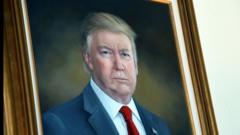Former President Donald Trump has recently made headlines for his mixed feelings about portraits of himself, particularly in light of a new painting he received as a gift from Russian President Vladimir Putin while simultaneously condemning a previously displayed portrait in Colorado.
Trump Critiques Old Portrait Amidst Gift from Putin

Trump Critiques Old Portrait Amidst Gift from Putin
In a bizarre turn of events, Trump received a new portrait from Putin while criticizing an old one in Colorado.
Trump's criticism came via Truth Social, where he described the now-removed Colorado artwork as "truly the worst" and "purposefully distorted." This painting, presented to the Colorado State Capitol in 2019, has drawn considerable attention, particularly after it was removed earlier this week following backlash against its portrayal of Trump. The U.S. President's outrage aside, the new portrait from Putin remains under wraps, and Kremlin spokesperson Dmitry Peskov has stated it is a "personal gift" that only Putin can speak on further.
The new portrait, noted to be a "beautiful" work by a leading Russian artist, was confirmed by Trump's envoy Steve Witkoff, who indicated that Trump was "clearly touched" by the gesture. This gift arrives as American and Russian negotiators continue discussions related to the ongoing situation in Ukraine, signaling a potential thaw in relations between the two nations since Trump's return to the presidency earlier this year.
Trump's reflective comments on the Colorado portrait highlighted a stark contrast with the artist's depiction of his predecessor, Barack Obama, whom Trump praised as looking "wonderful." Following a failed assassination attempt on him during a rally which resulted in one of his most iconic images, the former president has been particularly sensitive about how his image is portrayed.
The drama surrounding the Colorado portrait stirred political controversy, with Trump seizing the opportunity to criticize Democratic Colorado Governor Jared Polis. However, media coverage clarified that the backlash against the portrait was rooted in a crowdfunding initiative and not solely the governor's doing.
Artists weigh in on the subjectivity of presidential portraits, acknowledging that public reaction often stems from personal biases rather than artistic merit. This perspective was echoed by Robert Anderson, who expressed that portraying a polarizing figure like Trump presents unique challenges.
As portraiture continues to serve as a medium for political expression and public discourse, reactions to Trump's mixed feelings about artistry reflect broader cultural dynamics. Polis's office, responding to the controversy, noted its surprise at Trump's engagement with the Capitol's artwork and expressed commitment to enhancing the visitor experience there.
In this unfolding scenario, the nuances of how public figures are portrayed and perceived seem to resonate far beyond mere canvas and paint.
The new portrait, noted to be a "beautiful" work by a leading Russian artist, was confirmed by Trump's envoy Steve Witkoff, who indicated that Trump was "clearly touched" by the gesture. This gift arrives as American and Russian negotiators continue discussions related to the ongoing situation in Ukraine, signaling a potential thaw in relations between the two nations since Trump's return to the presidency earlier this year.
Trump's reflective comments on the Colorado portrait highlighted a stark contrast with the artist's depiction of his predecessor, Barack Obama, whom Trump praised as looking "wonderful." Following a failed assassination attempt on him during a rally which resulted in one of his most iconic images, the former president has been particularly sensitive about how his image is portrayed.
The drama surrounding the Colorado portrait stirred political controversy, with Trump seizing the opportunity to criticize Democratic Colorado Governor Jared Polis. However, media coverage clarified that the backlash against the portrait was rooted in a crowdfunding initiative and not solely the governor's doing.
Artists weigh in on the subjectivity of presidential portraits, acknowledging that public reaction often stems from personal biases rather than artistic merit. This perspective was echoed by Robert Anderson, who expressed that portraying a polarizing figure like Trump presents unique challenges.
As portraiture continues to serve as a medium for political expression and public discourse, reactions to Trump's mixed feelings about artistry reflect broader cultural dynamics. Polis's office, responding to the controversy, noted its surprise at Trump's engagement with the Capitol's artwork and expressed commitment to enhancing the visitor experience there.
In this unfolding scenario, the nuances of how public figures are portrayed and perceived seem to resonate far beyond mere canvas and paint.





















